 05-22-2019, 05:04 PM
05-22-2019, 05:04 PM
|
#21 (permalink)
|
|
Moderator
Join Date: Feb 2012
Location: Urbana, IL
Posts: 1,939
Thanks: 199
Thanked 1,807 Times in 943 Posts
|
As I mentioned in another thread here recently, those fins are not VGs. Toyota first used them on the 3rd gen Prius in 2010, and stated in the press materials that they improve directional stability--in other words, they are straightening vanes, similar to but not as pronounced as those seen on hypercars. Here's the 2015 Nissan LMP1 Le Mans car:

Toyota uses them on the current Prius, Camry, Corolla, Sienna, and Avalon.
Here are the diffuser vanes on the current Nissan Leaf, larger than Toyota's but with the same function:
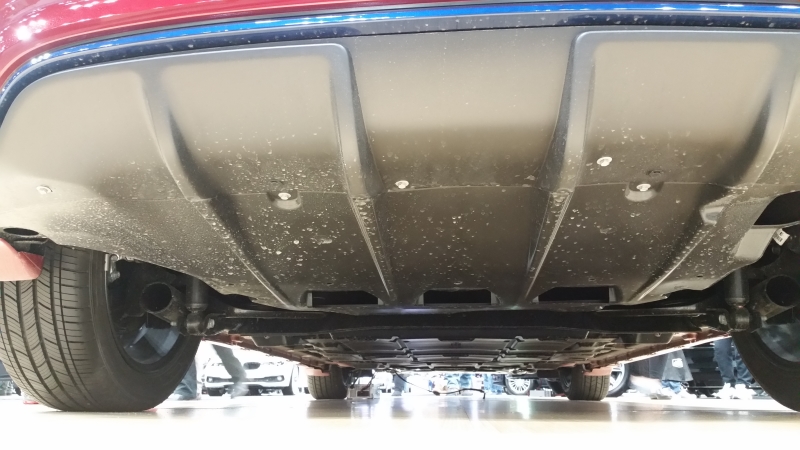
VGs are smaller, since they don't need to protrude beyond the boundary layer, and shorter, since they aren't directing airflow but disrupting it slightly.
|
|
|

|
|
The Following 3 Users Say Thank You to Vman455 For This Useful Post:
|
|
 Today Today
|
|
|
|
 Other popular topics in this forum...
Other popular topics in this forum...
|
|
|
|
 05-22-2019, 05:14 PM
05-22-2019, 05:14 PM
|
#22 (permalink)
|
|
Master EcoModder
Join Date: Jan 2008
Location: Sanger,Texas,U.S.A.
Posts: 16,381
Thanks: 24,467
Thanked 7,406 Times in 4,798 Posts
|
explanation
Quote:
Originally Posted by fastflyer

Other example:

Rear undertray of several Toyota. Those two fins has any explanation? |
I think 'fin' is the proper term for which to describe them.I don't believe they are concealing a body eruption under the car for which they would serve as a drag-reducing fairing.They are very well streamlined,and would not themselves produce any appreciable drag.
I'm not familiar with the particular
cars they belong on,and can only guess that these fins are there simply to direct the flow longitudinally,and prevent any transverse flow at the point of their attachment under the car.Why? I don't know.
It's also possible,that in a crosswind gust,the fins might provide some pressure-biased,directional stability,otherwise lacking without them.The gang of 'strakes' under the tail of the 1987 GM/AeroVironment SunRaycer,solar racer,were used exactly for this purpose.
__________________
Photobucket album: http://s1271.photobucket.com/albums/jj622/aerohead2/
|
|
|

|
 05-22-2019, 05:17 PM
05-22-2019, 05:17 PM
|
#23 (permalink)
|
|
Master EcoModder
Join Date: Jun 2016
Location: KY
Posts: 1,352
Thanks: 63
Thanked 366 Times in 269 Posts
|
Quote:
Originally Posted by kach22i

|
Those VGs ahead of the tire, I donít suppose they were aiming for the same effect as a wheel skirt, were they? I also see something similar in the airdam of the new Tacoma to (I guess) direct air around the tires
__________________
My current Ecotec project...

My last Ecotec project...

|
|
|

|
 05-22-2019, 05:24 PM
05-22-2019, 05:24 PM
|
#24 (permalink)
|
|
Master EcoModder
Join Date: Jan 2008
Location: Sanger,Texas,U.S.A.
Posts: 16,381
Thanks: 24,467
Thanked 7,406 Times in 4,798 Posts
|
vanes
Quote:
Originally Posted by Vman455

As I mentioned in another thread here recently, those fins are not VGs. Toyota first used them on the 3rd gen Prius in 2010, and stated in the press materials that they improve directional stability--in other words, they are straightening vanes, similar to but not as pronounced as those seen on hypercars. Here's the 2015 Nissan LMP1 Le Mans car:

Toyota uses them on the current Prius, Camry, Corolla, Sienna, and Avalon.
Here are the diffuser vanes on the current Nissan Leaf, larger than Toyota's but with the same function:

VGs are smaller, since they don't need to protrude beyond the boundary layer, and shorter, since they aren't directing airflow but disrupting it slightly. |
Another benefit of the vanes,are that of corrugated stiffeners,which allow for a very light panel which is devoid of sagging or flutter,while not adding any appreciable drag.
In a rear,quartering wind gust,the vanes might add a degree of crosswind stability,while also preventing transverse flow contamination of the diffuser.
__________________
Photobucket album: http://s1271.photobucket.com/albums/jj622/aerohead2/
|
|
|

|
 05-22-2019, 05:30 PM
05-22-2019, 05:30 PM
|
#25 (permalink)
|
|
Master EcoModder
Join Date: Jan 2008
Location: Sanger,Texas,U.S.A.
Posts: 16,381
Thanks: 24,467
Thanked 7,406 Times in 4,798 Posts
|
VGs ahead of the tires
I'm guessing that they are just flow guides,and to protect against spanwise flow,to keep the air directed straight back across the wheel.
__________________
Photobucket album: http://s1271.photobucket.com/albums/jj622/aerohead2/
|
|
|

|
 05-22-2019, 08:03 PM
05-22-2019, 08:03 PM
|
#26 (permalink)
|
|
Master EcoModder
Join Date: Aug 2012
Location: northwest of normal
Posts: 28,916
Thanks: 8,202
Thanked 8,983 Times in 7,420 Posts
|
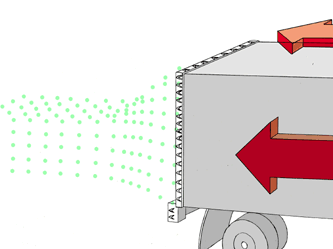
Airtabs add frontal area.
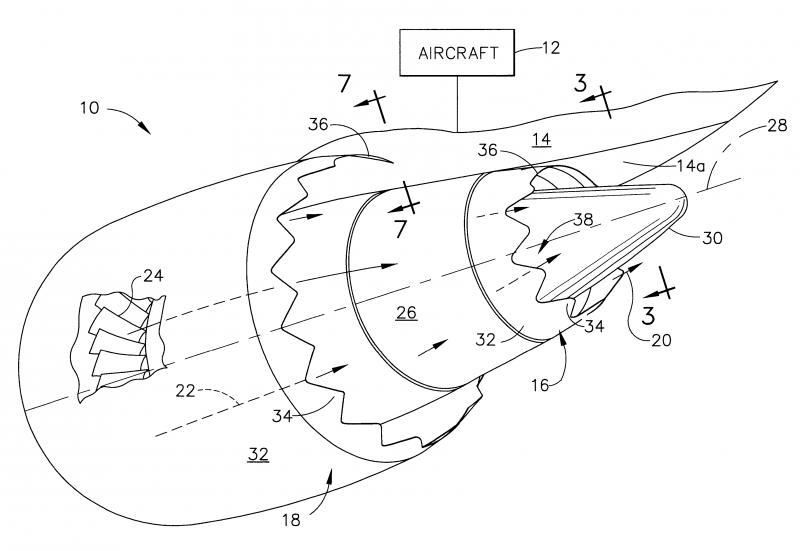
A serrated edge should have some similar effect.
__________________
.
.Without freedom of speech we wouldn't know who all the idiots are. -- anonymous poster
|
|
|

|
 05-23-2019, 09:13 PM
05-23-2019, 09:13 PM
|
#27 (permalink)
|
|
EcoModding Apprentice
Join Date: Apr 2012
Location: Charlotte, NC
Posts: 134
Thanks: 146
Thanked 110 Times in 47 Posts
|
Quote:
Originally Posted by Vman455

As I mentioned in another thread here recently, those fins are not VGs. Toyota first used them on the 3rd gen Prius in 2010, and stated in the press materials that they improve directional stability--in other words, they are straightening vanes, similar to but not as pronounced as those seen on hypercars. Here's the 2015 Nissan LMP1 Le Mans car:

Toyota uses them on the current Prius, Camry, Corolla, Sienna, and Avalon.
Here are the diffuser vanes on the current Nissan Leaf, larger than Toyota's but with the same function:

VGs are smaller, since they don't need to protrude beyond the boundary layer, and shorter, since they aren't directing airflow but disrupting it slightly. |
The primary purpose of strakes in an LMP1 diffuser is to segregate the flow fields considering the relatively dirty flow outboard near the spinning rear wheel. The secondary function is to generate vortices while in yaw. Some teams cut them short of the diffuser trailing edge or have cutouts and notches in them in order to further promote yaw-induced vorticeis. In LMP1 you're limited to one pair that must be parallel to car CL.
Short of diffuser TE:

Notch in strake TE:



Holes in strake:
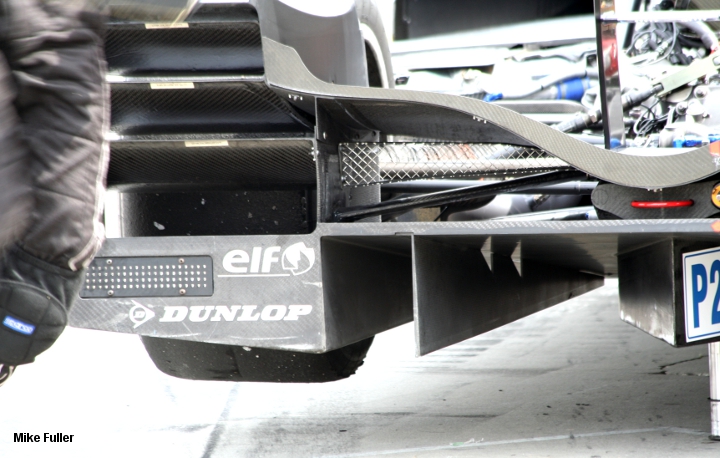
In the recent past, when there were few restrictions on their design, they were designed as vortex generators primarily.
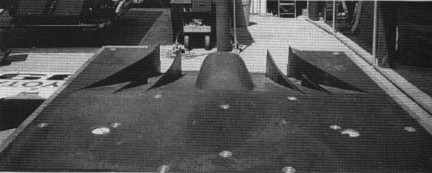


|
|
|

|
|
The Following 3 Users Say Thank You to woodstock74 For This Useful Post:
|
|
 05-27-2019, 07:20 PM
05-27-2019, 07:20 PM
|
#28 (permalink)
|
|
Aero Deshi
Join Date: Jan 2010
Location: Vero Beach, FL
Posts: 1,065
Thanks: 430
Thanked 669 Times in 358 Posts
|
This I thought was ecomodder, not increasedownforcemodder. One must keep in mind that the basic principle of low drag is to NOT disturb the air you are plunging through. The more you make the air move, the more drag that will be felt. Moving air takes energy, we call that extra energy drag. To that end, having something stick up can only make air move more. If you want to decrease drag, you need to change the basic shape of the thing being pushed through the air.
|
|
|

|
|
The Following User Says Thank You to ChazInMT For This Useful Post:
|
|
 05-27-2019, 07:29 PM
05-27-2019, 07:29 PM
|
#29 (permalink)
|
|
EcoModding Apprentice
Join Date: Apr 2012
Location: Charlotte, NC
Posts: 134
Thanks: 146
Thanked 110 Times in 47 Posts
|
Quote:
Originally Posted by ChazInMT

This I thought was ecomodder, not increasedownforcemodder. One must keep in mind that the basic principle of low drag is to NOT disturb the air you are plunging through. The more you make the air move, the more drag that will be felt. Moving air takes energy, we call that extra energy drag. To that end, having something stick up can only make air move more. If you want to decrease drag, you need to change the basic shape of the thing being pushed through the air.
|
Absolutely, there's very little to be learned looking at race cars. There is only one quest in racing, that's downforce. Downforce produces drag. |
|
|

|
 05-27-2019, 09:59 PM
05-27-2019, 09:59 PM
|
#30 (permalink)
|
|
Moderator
Join Date: Feb 2012
Location: Urbana, IL
Posts: 1,939
Thanks: 199
Thanked 1,807 Times in 943 Posts
|
Quote:
Originally Posted by ChazInMT

If you want to decrease drag, you need to change the basic shape of the thing being pushed through the air.
|
Yes--but, don't throw the baby out with the bathwater; there's a lot of room for improvement in detail optimization without changing the basic shape of the car (or even its look--Mercedes CLA, anyone?). That's 90% of what we do around here, after all.
|
|
|

|
|